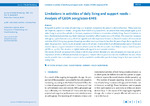Limitations in activities of daily living and support needs – Analysis of GEDA 2019/2020-EHIS
Fuchs, Judith
Gaertner, Beate
Prütz, Franziska
Being able to perform activities of daily living is an important component of a person's ability to function. If these activities are impaired, support is needed. Using data from GEDA 2019/2020-EHIS, we present how many people aged 55 and older living in private households in Germany experience limitations in activities of daily living. Severe limitations in basic (fundamental) activities (e.g. food intake) are reported by 5.8% of women and 3.7% of men. The proportion increases with age as 13.4% of women and 9.0% of men aged 80 and older experience limitations. Severe limitations of instrumental activities of daily living (e.g. grocery shopping) are rather rare in participants less than 80 years of age. But at age 80 and older the proportion rises to 35.9% of women and 21.0% of men. A total of 68.1% of afflicted women and 57.5% of men receive help and support related to limitations of basic activities. Women are also more likely to report a lack of support (48.8% vs. 43.2%). The situation is slightly better with regard to instrumental activities.
The results of GEDA 2019/2020-EHIS show in which areas of daily life older and very old people are impaired, give an impression of who is affected particularly strongly and indicate where support services are insufficient. As such, these results provide clues as to where support can be provided to enable older people to keep living in their own homes for a long time.
Files in this item

